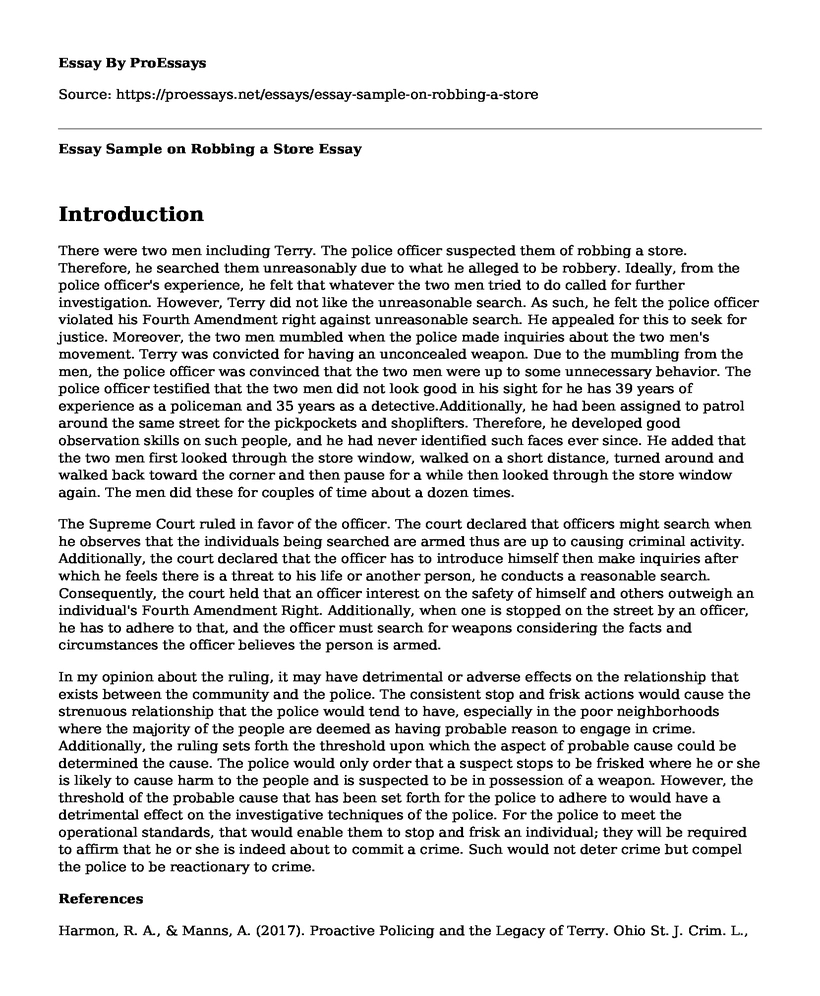Introduction
There were two men including Terry. The police officer suspected them of robbing a store. Therefore, he searched them unreasonably due to what he alleged to be robbery. Ideally, from the police officer's experience, he felt that whatever the two men tried to do called for further investigation. However, Terry did not like the unreasonable search. As such, he felt the police officer violated his Fourth Amendment right against unreasonable search. He appealed for this to seek for justice. Moreover, the two men mumbled when the police made inquiries about the two men's movement. Terry was convicted for having an unconcealed weapon. Due to the mumbling from the men, the police officer was convinced that the two men were up to some unnecessary behavior. The police officer testified that the two men did not look good in his sight for he has 39 years of experience as a policeman and 35 years as a detective.Additionally, he had been assigned to patrol around the same street for the pickpockets and shoplifters. Therefore, he developed good observation skills on such people, and he had never identified such faces ever since. He added that the two men first looked through the store window, walked on a short distance, turned around and walked back toward the corner and then pause for a while then looked through the store window again. The men did these for couples of time about a dozen times.
The Supreme Court ruled in favor of the officer. The court declared that officers might search when he observes that the individuals being searched are armed thus are up to causing criminal activity. Additionally, the court declared that the officer has to introduce himself then make inquiries after which he feels there is a threat to his life or another person, he conducts a reasonable search. Consequently, the court held that an officer interest on the safety of himself and others outweigh an individual's Fourth Amendment Right. Additionally, when one is stopped on the street by an officer, he has to adhere to that, and the officer must search for weapons considering the facts and circumstances the officer believes the person is armed.
In my opinion about the ruling, it may have detrimental or adverse effects on the relationship that exists between the community and the police. The consistent stop and frisk actions would cause the strenuous relationship that the police would tend to have, especially in the poor neighborhoods where the majority of the people are deemed as having probable reason to engage in crime. Additionally, the ruling sets forth the threshold upon which the aspect of probable cause could be determined the cause. The police would only order that a suspect stops to be frisked where he or she is likely to cause harm to the people and is suspected to be in possession of a weapon. However, the threshold of the probable cause that has been set forth for the police to adhere to would have a detrimental effect on the investigative techniques of the police. For the police to meet the operational standards, that would enable them to stop and frisk an individual; they will be required to affirm that he or she is indeed about to commit a crime. Such would not deter crime but compel the police to be reactionary to crime.
References
Harmon, R. A., & Manns, A. (2017). Proactive Policing and the Legacy of Terry. Ohio St. J. Crim. L., 15, 49.
Terry v. Ohio, 392 U.S. 1, 88 S. Ct. 1868, 20 L. Ed. 2d 889 (1968).
Cite this page
Essay Sample on Robbing a Store. (2022, Nov 11). Retrieved from https://proessays.net/essays/essay-sample-on-robbing-a-store
If you are the original author of this essay and no longer wish to have it published on the ProEssays website, please click below to request its removal:
- Public Transport System Development
- Report Example: The GMT Homes and Z-Tec Developments Project Management
- Police Officer PTSD and Mental Health Videos Reflection Essay
- Research Paper on Involving Fire Suppressants
- Essay Sample on Savannah's Congested Transport System: Need for Change in Policies
- Essay Example on Monthly Interest Beats Annual: Compounding for Better Returns
- Exploring Policing and Race: A Review of Security and Its Impact







